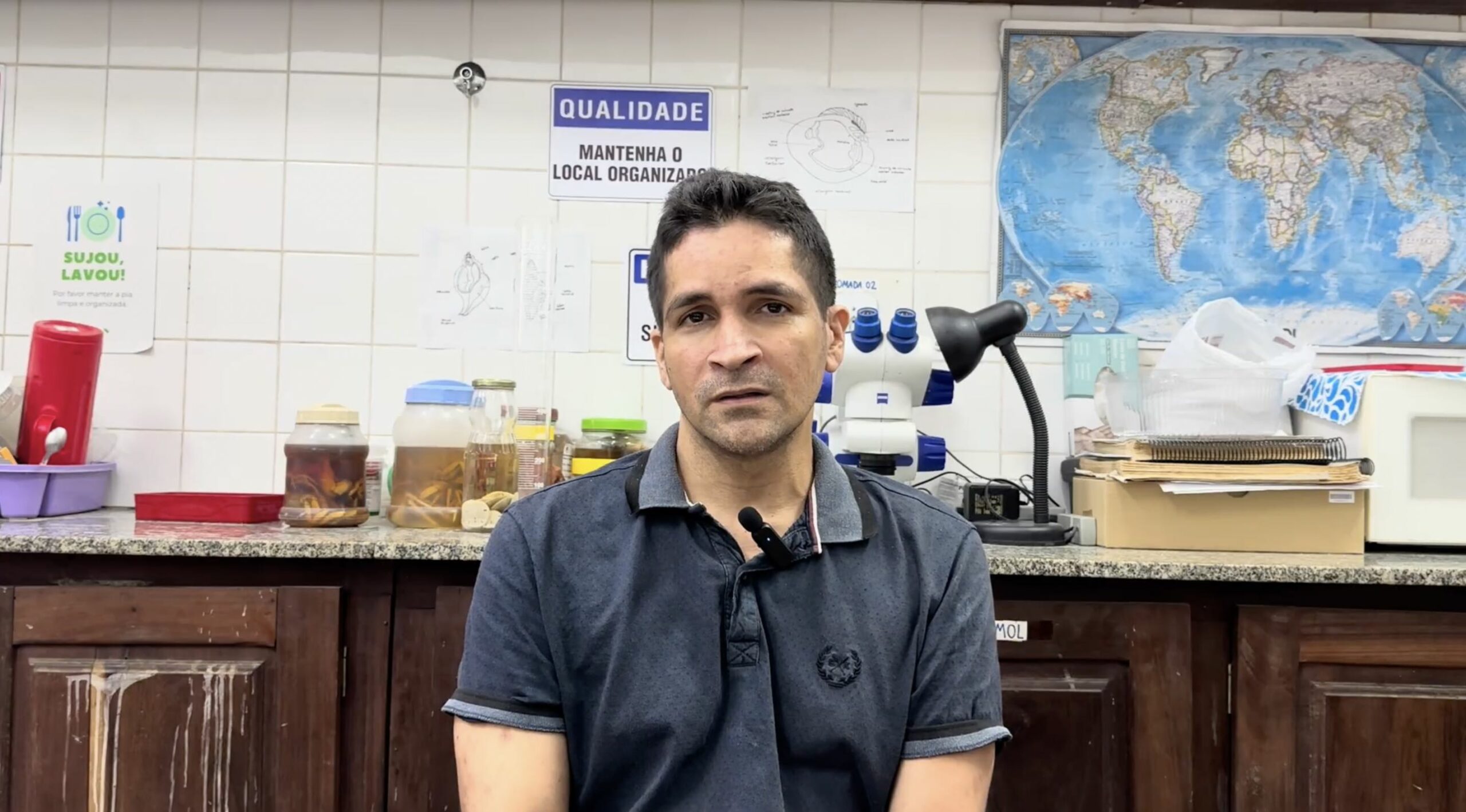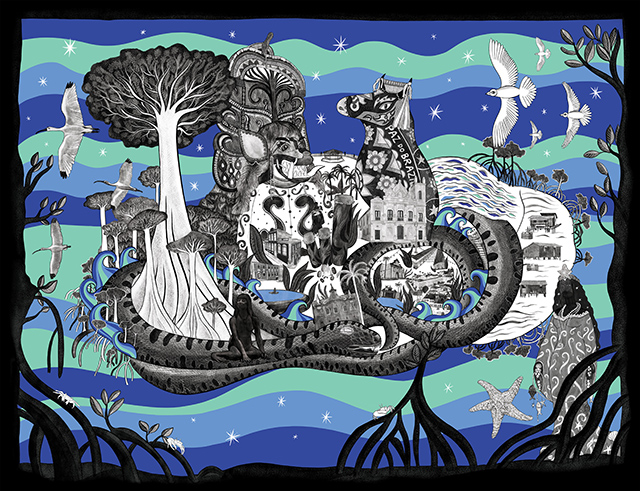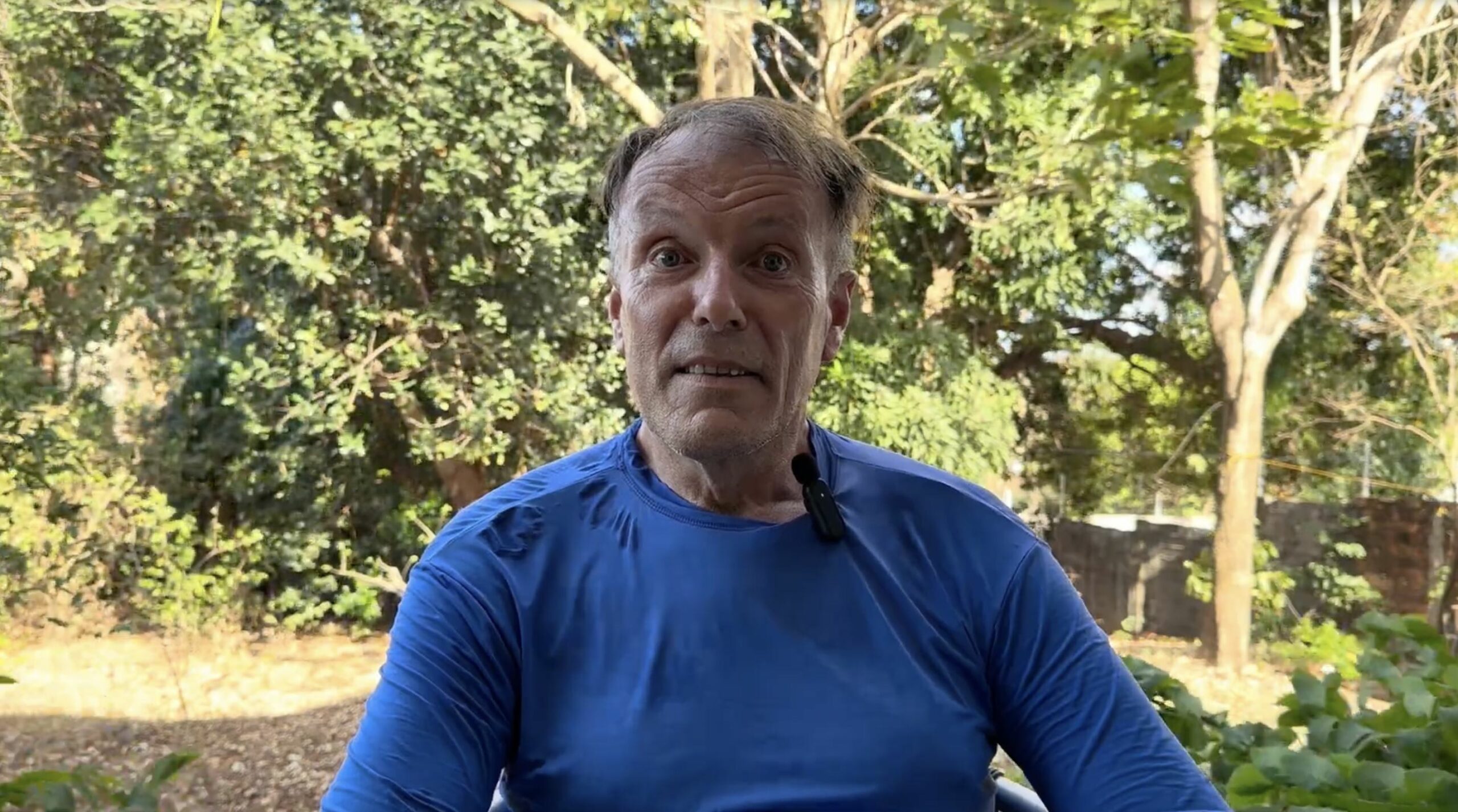
Denilson Bezerra is a professor in the Department of Oceanography and Limnology at the Federal University of Maranhão. His research focuses on sea level rise in Brazil, particularly the evolution of mangroves, which he studies as bioindicators of climate change.
‘Mangroves, as they say, are indicators of sea level rise.’
According to him, this transitional ecosystem between sea and land reacts directly to changes in sea level: it can recede, migrate inland or resist coastal erosion. Brazil is home to the world’s largest continuous strip of mangroves, stretching from Maranhão to Pará and Amapá, in what is known as the Legal Amazon. ‘Brazil has the largest continuous area of Amazonian mangroves,’ he says.
Insufficient data to assess the extent of the phenomenon
Denilson highlights the lack of accurate data on sea level rise in Brazil: « We have no measured monitoring of the increase in the water column in the sea. ‘Currently, only satellite images and remote sensing can be used to estimate how it is changing.’
However, his field observations in the Baixada Maranhense region reveal significant changes. This area of freshwater lagoons is now seeing increasing saltwater intrusion, altering the entire local ecosystem: ‘Areas that were once freshwater are becoming brackish.’ He adds: ‘We are beginning to notice a change in the fish fauna. Freshwater fish are giving way to estuarine species, directly affecting traditional fishing.’
Impacts on health and daily life
These changes have direct consequences for the population. Denilson warns of the salinisation of groundwater: ‘People used to drill wells near the rivers and drink the water. Now the river is becoming brackish.’ He mentions an increase in diseases linked to this contamination, particularly high blood pressure.
In São Luís, the capital of Maranhão, he notes that the tides are becoming increasingly aggressive: ‘The waves are more aggressive, and we are already seeing an impact on tourism.’ Buildings are under threat, beaches are being eroded, and new mangroves are appearing in previously urban areas. ‘This is not necessarily a good thing, but it is an indication.’
A society waking up, but still unprepared
According to Denilson, society is beginning to wake up to the problem. ‘The private sector itself […] is directly calling on universities to carry out studies on sea level rise.’ He emphasises this change: urban engineers are now turning to researchers to anticipate risks.
Despite this progress, he considers the region to be vulnerable: ‘What’s missing? Sea level rise is a fact, people are going to be affected by it, and we need to prepare society for that.’ He calls for proactive public policies in education, health, infrastructure and rehousing for the most vulnerable populations.
‘Can our bridges withstand the advancing sea?’ he asks, referring in particular to the Francisco Bridge and the houses built on stilts. He proposes a comprehensive adaptation programme: « A training programme for these people, in other words, a comprehensive adaptation programme. «
Adapt, because there is no going back
For Denilson, it is no longer a question of preventing a phenomenon, but of adapting to an inevitable reality. He points to the low-lying topography of the island of São Luís and the frequency of extreme events such as floods, fires and weather-related tsunamis. These increasingly frequent events are making the situation critical.
His modelling work shows that the entire coastline of São Luís will have to be redesigned: ‘Hotels will have to be moved, and resources will have to be allocated to move buildings from one place to another.’
‘The private sector itself […] is directly calling on the university to conduct studies on sea level rise.’ Despite this development, he considers the region to be vulnerable.
Growing involvement of public authorities
Denilson has observed a gradual change in the stance of public authorities:
The government of Maranhão, the state government and the municipalities are trying to understand what is happening. «
While the early years of his academic career focused more on engineering and fishing, since 2020 he has seen growing interest in the effects of climate change. The university is now regularly called upon to participate in national plans, such as those to combat fires and drought, and in expert meetings on changes in low-lying coastal areas:
‘They call on universities – public, private and foreign – to understand what is really happening in our coastal area.’
Policies in the making: from legislation to adaptation
In response to these challenges, discussions are underway to adapt legislation:
« They are already considering legislation to combat sea level rise. ‘
Carbon credit policies are being considered. While everything is still in the exploratory phase, Denilson points to one major fact: ’The big positive I see is that public managers are aware of the discussion. «
He cites the Fresh Water Programme (PAD), led by the Maranhão state government with federal support, as an example of concrete action. The programme targets rural communities affected by freshwater salinisation. It involves installing mini desalination plants and training residents in their use.
Recognising the scale of the challenge: groundwork to be done
Denilson insists, however:
‘We are only at the beginning.’
The Maranhão coastline is immense, and 47% of Brazil’s mangroves are found there. He calls for a thorough understanding of the situation to ensure that the actions taken are not merely emergency solutions.
A paradigm shift driven by the younger generations
Denilson has observed a significant transformation since the 2018 elections:
‘Until 2018, many people questioned climate change, dismissing it as ideology. Today, the discourse has completely changed.’ He highlights the importance of the debate, which is now more peaceful and cross-cutting, even in universities. Above all, he highlights the growing awareness among young people:
‘The children of today, at the beginning of the 21st century, will be the adults of tomorrow, the future managers, activists and scientists.’
He notes that consumption is changing:
« I grew up in a generation of extreme consumption. Today, children are already being educated, both at home and at school, to rethink their consumption. ‘
Education as a lever for change
Denilson is also involved in practical educational initiatives. The Federal University (UFMA) is working with schools on these issues:
’We present our sea level rise simulation models, calculated up to 2100, using satellite images. »
These tools are used to raise awareness among students through powerful visual aids. For him, the climate is an issue that can no longer be ignored:
‘This is not a left-wing or right-wing agenda. It is an agenda for humanity.’
He concludes on a hopeful note:
‘The first step is to recognise that there is a problem. Today, people are aware of the issue, and this is generating a process of awareness.’
Testimonies from the same panel


